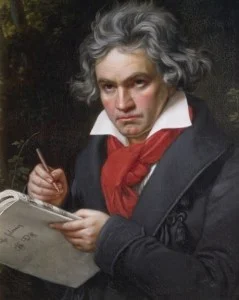7 Fun Facts About Beethoven You Never Knew
To celebrate the 245th anniversary of the great composer’s birth (marked by this morning’s Google doodle), here are 7 things you never knew about Ludwig van Beethoven.
Link to Googles Beethoven doodle here.
1. We don’t actually know when he was born
There is no reliable record of Beethoven’s birth-date. His birthday is usually celebrated on December 17, the date of his Catholic baptism (which survives in the parish records). Most scholars believe the composer was born on either December 15 or, more likely, December 16, 1770.
2. His First Concerto wasn’t his first concerto
Although it was the first concerto he published, Beethoven’s Piano Concerto Number One in C Major was, in fact his third concerto. His Piano Concerto Number Two was written a decade earlier, between 1787 and 1789. He had also completed an unpublished piano concerto in 1784, but only part of the manuscript for this piece survives.

3. He was terrible at math
Despite the mathematical complexity of his compositions, Beethoven always struggled with numbers. He left school at the age of 11, after learning how to add and subtract, but before learning how to multiply or divide. As a result, he found it difficult to keep track of his finances. In an 1801 letter, he described himself as “really an incompetent business man who is bad at arithmetic”.

4. People hated his Late Quartets
Beethoven’s late, experimental masterpieces shocked and confused his contemporaries. The composer Louis Spohr even described the string quartets as “indecipherable, uncorrected horrors”. For Beethoven, however, they were attempts to connect with the divine. At the top of the manuscript for op.132, he described the piece as a “sacred song of thanksgiving from a convalescent to the deity”.
5. He might have once performed for Mozart
In 1787, Beethoven made his first visit to Vienna, where Mozart was living at the time. According to the 19th century biographer Otto Jahn, the nervous 17-year-old “was introduced to Mozart, and played to him at his request”. “Mozart, considering the piece he performed to be a studied show-piece, was somewhat cold in his expressions of admiration,” Jahn writes. “Beethoven, noticing this, begged for a theme for improvisation, and, inspired by the presence of the master he revered so highly, played in such a manner as gradually to engross Mozart’s whole attention; turning quietly to the bystanders, he said emphatically, ‘Mark that young man; he will make himself a name in the world!’”

6. Deafness wasn’t the worst of his problems
Throughout his life, the composer was plagued by ill health. He suffered from chronic hepatitis, jaundice, colitis, various skin diseases, rheumatic fever and cirrhosis of the liver. Before he died in 1827, aged 56, 25 pounds of water had to be drained from his abdomen. Despite the pain of undergoing the operation without any anesthetic, Beethoven kept his sense of humor. He joked that his doctor was “like Moses, striking water from a rock”.

7. His last words probably aren’t what you think they are
Many people believe that Beethoven’s last words were “I shall hear music in heaven”, but there is little evidence to support this. Shortly after his death, a popular belief began that his last words were “plaudite, amici, commedia finita est” (“Applaud, my friends, the comedy is over”), the traditional instruction at the end of an Italian commedia dell’arte. But his close friend Anselm Hüttenbrenner , who was present at his death, specifically refuted the rumour. In the most reliable account we have, Beethoven’s last recorded words were actually about wine. On learning that his publisher had sent him a case of red wine, he said: “Pity, pity – too late.”
Credits – The Telegraph




